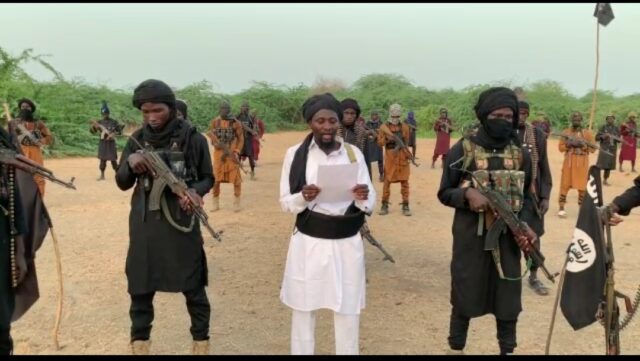
Brief: Three Years After Death of Shekau, Boko Haram Appears to Gain on ISWAP Under Leadership of Bakura
Publication: Terrorism Monitor Volume: 22 Issue: 8
By:

Executive Summary:
- The faction of Boko Haram once led by Abubakar Shekau is under the leadership of a commander named Bakura Doro, who has managed to win territory from rival jihadist group Islamic State in West Africa Province (ISWAP), which is generally understood to be much stronger than Shekau’s remnants.
- Bakura’s faction is increasingly removed from the “global jihadist movement,” which limits its media appeal, but may also allow it to fly under the radar of the international counter-terrorism regime.
In May 2021, Abubakar Shekau, the megalomaniacal leader of Boko Haram, detonated an explosive to kill himself to avoid capture by rival jihadist group Islamic State in West Africa Province (ISWAP). Shekau, the sole “face” of Boko Haram, had antagonized ISWAP and higher-ups in Islamic State (IS) by ignoring orders from the latter, most notably regarding exhortations against his group’s infamous enslavement of Muslim women. As a result, despite Shekau’s official allegiance to IS, the group’s leadership ejected him from ISWAP in 2016 and ultimately collaborated with ISWAP to plan their final offensive against Shekau and his breakaway faction five years later (Vanguard [Nigeria], June 28, 2021).
Shekau’s faction began losing fighters to ISWAP after his death. These militants’ return to ISWAP may partially be explained by the fact that many might have otherwise chosen to do so before, but feared retribution against themselves or their families from the famously brutal Shekau. Moreover, loyalists were likely attracted to ISWAP and its official recognition from IS as the group’s affiliate in the region, whereas Shekau’s faction had been “excommunicated” years ago. Three years after his death, the Shekau faction is still losing fighters, both to constant fratricidal warfare with ISWAP and to the seductive comfort of the Nigerian army’s rehabilitation program—all the more attractive when compared with the harsh conditions found in Boko Haram’s camps (Pulse Nigeria, March 26).
In spite of these pressures, Shekau’s faction has proven highly resilient. The splinter group did not fold despite the death of its leader, who had led Boko Haram since the launch of its insurgency in 2010. Moreover, recent reports suggest that Shekau’s faction may actually be gaining ground against ISWAP, especially around Lake Chad (Crisis Group, March 28).
The group was led by two “Bakura”s in the aftermath of Shekau’s death. This arrangement was broken when Bakura Doro had Bakura Modu (sometimes called Bakura Sahalaba or Sahaba) killed, who is believed to have been an advocate for mending relations with ISWAP (Crisis Group, March 28; Daily Trust [Nigeria], June 18, 2021). This led to further fighting between the handful of fighters loyal to the dead Bakura and the one who leads Shekau’s old faction now.
Bakura’s leadership style is said to be quite different than Shekau’s. He abstains from bombast and media appearances, but still operates alongside fighters in their operations, whether they be raids on villages or ambushes against ISWAP and the region’s militaries (Crisis Group, March 28). In contrast, Shekau rarely fought in battles and was eager to appear in videos and media as much as possible. Shekau’s strange mannerisms, including jumping in circles while shooting a gun, contributed to IS’s policy of not allowing him to be seen in videos, before it kicked him out altogether (Long War Journal, February 23, 2015). The faction has, therefore, managed to survive and even gain ground under two very differently styled leaders—Shekau and Bakura.
As a result of the Shekau–Bakura faction lacking any formal media apparatus, the Boko Haram splinter group does not receive significant media attention. The faction tends not to claim any attacks. The exception to this rule came immediately after Shekau’s death, when the now-dead Bakura appeared in several videos to announce his leadership over the group, having been allegedly chosen as Shekau’s successor in the former leader’s will (Crisis Group, March 28; Daily Trust [Nigeria], June 18, 2021). In the videos, the late Bakura even mimicked IS’s style for claiming attacks (Unmasking Boko Haram, June 14, 2021).
Bakura’s faction is increasingly removed from the “global jihadist movement.” It has few external linkages and fails to promote key jihadist talking points through various forms of media like other groups do. Thus, even while ISWAP has garnered the most attention and coverage from Nigerian sources, as well as governments and media around the world, analysts and security operatives should not lose sight of the threat posed by Bakura and his fighters—or the various ways in which Boko Haram might evolve going forward.



